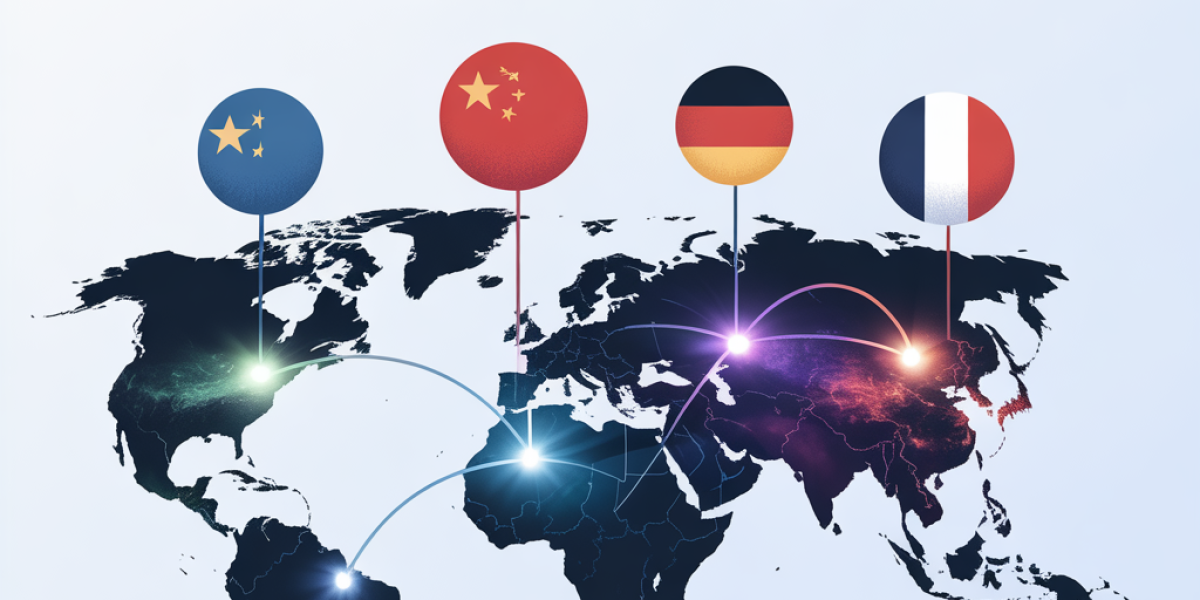Introduction
In today’s globalized world, language skills have become more valuable than ever. Whether you’re looking to advance your career, explore new cultures, or simply challenge yourself intellectually, learning a new language can open doors to countless opportunities. As we approach 2025, certain languages are emerging as particularly advantageous due to economic trends, technological advancements, and geopolitical shifts. In this article, we’ll explore the best languages to learn in 2025 , providing insights into why each one is worth your time and effort.
Why Learning a New Language Matters in 2025
Before diving into the list of top languages, it’s important to understand why language learning remains relevant—and even more critical—in the coming years.
1. Career Advancement
Multilingual individuals often enjoy better job prospects and higher salaries. Companies operating internationally seek employees who can communicate effectively with clients, partners, and colleagues around the globe.
2. Cultural Awareness and Personal Growth
Learning a new language isn’t just about grammar and vocabulary—it’s about understanding different perspectives, traditions, and ways of thinking. This cultural competence fosters empathy, broadens horizons, and enhances personal development.
3. Travel and Communication
Whether you’re backpacking through Europe or negotiating a business deal in Asia, knowing the local language makes every experience richer and more authentic.
4. Technological Integration
With AI-driven translation tools becoming more sophisticated, some may question the need for language learning. However, human fluency still provides nuance, emotional intelligence, and trust-building capabilities that machines cannot replicate.
The Top 10 Best Languages to Learn in 2025
Let’s explore the top languages to consider mastering in 2025 based on their global influence, economic importance, and future potential.
1. Mandarin Chinese
Overview:
Mandarin Chinese is the most spoken language in the world by native speakers. With over 900 million people speaking it globally, Mandarin is not only crucial for communication but also essential for anyone interested in doing business with China.
Why It’s Important in 2025:
- Economic Powerhouse : China continues to be a dominant force in global trade and investment.
- Tech Innovation : China leads in AI, e-commerce, and fintech—knowing Mandarin gives access to cutting-edge research and partnerships.
- Diplomatic Relations : As international relations evolve, understanding Mandarin becomes increasingly strategic.
Difficulty Level:
Mandarin has a complex writing system and tonal pronunciation, making it challenging for English speakers. However, with consistent practice and modern learning tools, it’s very achievable.
Learning Resources:
- Duolingo
- HelloChinese
- Mandarin Pod
- iTalki (for live tutors)
2. Spanish
Overview:
Spanish is the second most spoken language by number of native speakers and is widely used across the Americas, Europe, and parts of Africa.
Why It’s Important in 2025:
- Demographic Growth : The U.S. has one of the largest Spanish-speaking populations in the world.
- Business Expansion : Latin American markets are growing rapidly, especially in tech and renewable energy sectors.
- Tourism and Hospitality : Spanish is essential in service industries where customer interaction spans multiple countries.
Difficulty Level:
Relatively easy for English speakers due to shared Latin roots and similar sentence structures.
Learning Resources:
- Babbel
- Rosetta Stone
- SpanishDict
- FluentU
3. French
Overview:
French is an official language in 29 countries and is widely spoken across Europe, Africa, and Canada.
Why It’s Important in 2025:
- International Diplomacy : French is one of the official languages of the United Nations, NATO, and the European Union.
- African Growth : Many African economies are booming, and French is the lingua franca in several key regions.
- Culture and Arts : France remains a leader in fashion, cuisine, film, and literature.
Difficulty Level:
Moderate. French pronunciation and grammar can be tricky, but its structured nature helps learners progress steadily.
Learning Resources:
- Memrise
- LingQ
- TV5Monde (for news and media)
- Alliance Française (language centers worldwide)
4. Arabic
Overview:
Arabic is the liturgical language of Islam and is spoken across the Middle East and North Africa. It has numerous dialects, but Modern Standard Arabic is commonly taught.
Why It’s Important in 2025:
- Geopolitical Relevance : The Middle East plays a pivotal role in global politics, energy, and security.
- Economic Investment : Gulf countries like UAE and Saudi Arabia are investing heavily in technology and infrastructure.
- Job Demand : There’s a high demand for Arabic speakers in defense, intelligence, and diplomatic services.
Difficulty Level:
High. Arabic uses a unique script and has complex grammar rules, but it’s highly rewarding for those committed to learning.
Learning Resources:
- Mango Languages
- Al-Quran.info (for reading practice)
- ArabicPod101
- University courses or private tutoring
5. German
Overview:
German is the most widely spoken language in the European Union and is known for its precision and technical vocabulary.
Why It’s Important in 2025:
- Engineering and Innovation : Germany leads in automotive engineering, manufacturing, and green technologies.
- EU Influence : As a central EU member, Germany holds significant political and economic sway.
- Higher Education : German universities offer many free or low-cost programs, especially in STEM fields.
Difficulty Level:
Moderate. German grammar is structured and logical, though word order and compound nouns can be challenging.
Learning Resources:
- Deutsche Welle (DW)
- Beolingus
- Goethe-Institut
- Busuu
6. Portuguese
Overview:
Portuguese is spoken in Portugal, Brazil, and parts of Africa and Asia. Brazilian Portuguese is the most widely spoken variant.
Why It’s Important in 2025:
- Brazilian Economy : Brazil is a major player in agriculture, mining, and renewable energy.
- Lusophone Markets : Portuguese is gaining traction in African nations like Angola and Mozambique.
- Cultural Richness : Brazil’s vibrant culture, music, and tourism industry make Portuguese desirable.
Difficulty Level:
Relatively easy for English speakers, especially if familiar with other Romance languages.
Learning Resources:
- Pimsleur
- Coffee Break Portuguese
- Tá Falado
- Portuguese Lab Podcast
7. Japanese
Overview:
Japanese is spoken by over 125 million people and is integral to Japan’s advanced economy and pop culture.
Why It’s Important in 2025:
- Technology Leadership : Japan is at the forefront of robotics, gaming, and automotive innovation.
- Anime and Media Influence : Japanese pop culture has a massive global following.
- Business Partnerships : Japanese companies are major investors in clean energy and AI.
Difficulty Level:
High. Japanese uses three writing systems (hiragana, katakana, kanji) and has complex honorifics.
Learning Resources:
- WaniKani (kanji learning)
- Jisho.org (dictionary)
- JapanesePod101
- KanjiAlive
8. Korean
Overview:
Korean is spoken in both North and South Korea, with South Korea being the primary hub for education, entertainment, and business.
Why It’s Important in 2025:
- Hallyu Wave : K-pop, K-dramas, and Korean cinema are dominating global entertainment.
- Tech and Startups : South Korea is a leader in semiconductors, smartphones, and digital content creation.
- Education Opportunities : Korean universities are attracting international students with scholarships.
Difficulty Level:
Moderate. Hangul (Korean alphabet) is easy to learn, but grammar and speech levels can be complex.
Learning Resources:
- Talk To Me In Korean (TTMIK)
- MyKoreanLevel
- Naver Dictionary
- KoreanClass101
9. Hindi
Overview:
Hindi is one of the official languages of India and is spoken by hundreds of millions of people across South Asia.
Why It’s Important in 2025:
- India’s Rise : India is projected to become the world’s third-largest economy.
- IT and Outsourcing : India remains a global leader in IT services and software development.
- Cultural Influence : Bollywood and Indian cuisine continue to captivate global audiences.
Difficulty Level:
Moderate. Devanagari script and verb conjugations can be challenging, but pronunciation is relatively straightforward.
Learning Resources:
- Transparent Language
- HindiPod101
- Anil’s Hindi Lessons
- Spoken Tutorial Project (IIT Bombay)
10. Italian
Overview:
Italian is spoken in Italy and parts of Switzerland, Croatia, and Slovenia. It’s also widely studied for its historical and artistic significance.
Why It’s Important in 2025:
- Cultural Heritage : Italy is a hub for art, design, architecture, and fashion.
- Tourism Industry : Millions of tourists visit Italy annually, creating demand for Italian speakers.
- EU Collaboration : Italy plays a key role in European politics and trade.
Difficulty Level:
Easy to moderate. Italian shares roots with English and other Romance languages, making it accessible.
Learning Resources:
- Yabla
- ItalianPod101
- Paroliario
- Dante Alighieri Society
Honorable Mentions
While the above ten are top contenders, here are a few additional languages gaining traction:
- Russian : For diplomacy, cybersecurity, and Eastern European business.
- Turkish : Strategic location between Europe and Asia, growing economy.
- Indonesian/Malay : ASEAN region’s rising influence in Southeast Asia.
- Swahili : Increasing relevance in East Africa’s economic corridors.
How to Choose the Right Language for You
Choosing the best language depends on your goals. Consider the following factors:
Career Goals:
- Want to work in finance? Mandarin or French could be ideal.
- Interested in tech? Japanese, Korean, or German might suit you.
Travel Interests:
- Love Mediterranean culture? Try Italian or Spanish.
- Dream of visiting Japan or Korea? Start with Japanese or Korean.
Cultural Curiosity:
- Fascinated by history and philosophy? Explore Arabic or Greek.
- Passionate about literature and arts? French or Italian may appeal to you.
Ease of Learning:
- Looking for a quick win? Spanish, Italian, or Dutch are great options.
- Up for a challenge? Mandarin, Japanese, or Arabic offer deep rewards.
Tips for Successful Language Learning in 2025
- Set Clear Goals : Define why you want to learn and what level you aim to reach.
- Immerse Yourself : Surround yourself with the language through movies, music, podcasts, and books.
- Practice Daily : Consistency is key. Even 15–30 minutes daily can lead to fluency over time.
- Use Technology : Take advantage of apps, online tutors, and AI-powered language assistants.
- Speak from Day One : Don’t wait until you’re “perfect.” Practice speaking early and often.
- Find a Community : Join language exchange groups, online forums, or local clubs.
- Track Your Progress : Use flashcards, quizzes, or language proficiency tests to measure improvement.
Conclusion
As we step into 2025, the ability to speak multiple languages is no longer just an impressive skill—it’s a necessity. Whether driven by professional ambition, cultural curiosity, or personal fulfillment, learning a new language offers unparalleled benefits. The best languages to learn in 2025—ranging from Mandarin to Spanish—are gateways to global connections, economic opportunities, and deeper understanding of our interconnected world.
So, pick a language that aligns with your goals, immerse yourself in its culture, and start your journey toward fluency today. The future is multilingual—and it starts with you.
Frequently Asked Questions (FAQ)
Q: What is the easiest language for English speakers to learn?
A: Spanish, French, and Italian are generally considered the easiest due to shared linguistic roots.
Q: Is it possible to become fluent in a language using apps alone?
A: While apps are excellent for building vocabulary and grammar, achieving fluency usually requires real-life conversation and immersion.
Q: Should I focus on one language at a time or learn multiple simultaneously?
A: Most experts recommend focusing on one language to avoid confusion and build a solid foundation.
Q: How long does it take to become fluent in a language?
A: On average, it takes 600–750 hours of study for easier languages and up to 2,200 hours for more difficult ones like Mandarin or Arabic.
Q: Are there any free resources to learn these languages?
A: Yes! Websites like Duolingo, BBC Languages, and Open Culture offer free lessons and materials.

